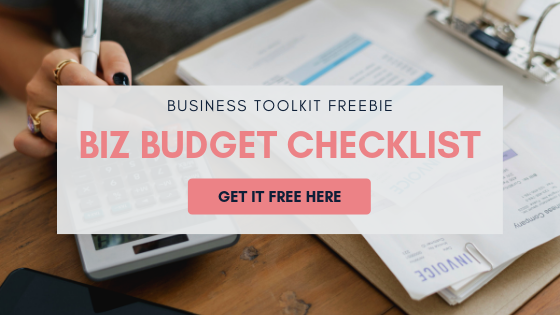Where to Spend Money In Your Business (vs What You Should DIY)

To start off, let’s get real here. I am the QUEEN of seesawing between spending money and not in my business. Yup, I admitted it. I am in a constant struggle to find this balance. To be completely candid, I’m still working out the secret. When you’re a small business owner (and especially a new one!) it is so tough to decide where to spend your limited resources, and the decision can often feel paralyzing. Read on for the things that I 100% believe, about how to spend money in business when you’re just starting out, and the things that I think you absolutely can DIY.
Spend It: Technology + Automation
I don’t care what your business is, it likely relies on some form of technology. I feel so strongly that the money spent on technology is not wasted. That is, as long as it accomplishes three things: 1) makes your customer experience easier/better/faster, 2) simplifies and/or automates your processes and 3) allows you to reach more and sell more.
As an entrepreneur, your time is hugely valuable. Anything that makes you more efficient and/or automates a process is usually worth the money. That said, while I do think technology is absolutely worth spending money on, don’t get carried away by the newest and greatest. There are so many technologies out there to do literally everything you could imagine. But, you don’t need all of them. I think the most important tech tools in any business fit into the following categories (but you don’t need to pay for all of these!):
- Task Management
- E-Commerce / Website
- Client Invoicing + Relationship Management
- Customer Service + Follow-up
- Social Media / Marketing (focusing on batching + scheduling)
Spend It: Legal, Financial + Tax Compliance
Did you read the words “legal and financial compliance” and groan? I hear you. While I am a financial and tax nerd, I know that most people aren’t and the “money and rules” side of the business is not fun to most people. However, I do think it’s a side of the business you can’t afford to ignore. When it comes to spending money, don’t skimp when you’re setting up your business and when you’re handling the ongoing compliance. While the cost of hiring an attorney or an accountant may seem overwhelming at the start, the cost to deal with legal issues or tax audits down the road will be so much greater if you don’t protect yourself in the first place. So specifically what do I recommend you spend your money on?
- Properly drafted Privacy Policy, Terms of Use and Website Disclaimer. These should be drafted by an attorney for your specific purpose. DO NOT take these from someone else’s website. Pro Tip: You don’t necessarily have to hire an attorney to draft these completely custom for you. There are several companies out there that sell legal templates that may suffice. I recommend reaching out and chatting with them to confirm they will work for your purpose.
- Rock solid contracts. Depending on your line of work, you may need contracts. This is another area where you don’t want to skimp, and you definitely don’t want to take these from someone else. I think a contract is always important, even if (especially if!) you’re working with someone you know.
- Proper Tax Advice. Before starting your business, consult a tax accountant. They can advise you on the different tax entity options, as well as a few other items to figure out (EIN, cash vs. accrual, etc.). They will also help you understand your monthly, quarterly, and annual tax filings at the local, state, and federal levels.
- Good Bookkeeping Software. Even if you can’t afford a monthly bookkeeper, make sure you have solid bookkeeping software. Make sure that you, or whoever is working in the software, knows how to use it. In addition to allowing you to have a good sense of your business’ financial state, staying up-to-date and organized will make tax time much easier (and cheaper if you are working with an accountant).
- Insurance. Don’t be an idiot, get insurance. Bad stuff happens and you don’t want to lose your business because of it. What type of insurance and how much you need will depend on your business. Ask around and talk to a qualified agent.
Spend It: Your Team
Repeat after me: I cannot do everything myself. I cannot do everything myself. Got it? Good.
Even when you are just starting out, you need to recognize your limitations (such as time and skillsets). While it’s important to do some tasks to improve your skillsets (see below), outsourcing is key. It will be critical to allow you to work on your business instead of in your business.
So how do I know when to outsource? These are my 3 general criteria:
- It will directly bring me in more revenue. So for example, if I hire someone to take on additional clients (and those clients are already there, waiting to work with me), this will result in more revenue.
- It can be done much better by someone else. There are just some tasks that are not in my wheelhouse, and no matter how much I learn or practice, someone else can still do it faster and better than I can.
- It will free up more time for me to focus on more valuable tasks. If you find yourself doing a lot of tasks that are simple and easy but take up a lot of your time and someone else can do those just as easily, your time can probably be better spent.
Save It: Education
OK, so this is a controversial one (in my own head), because I have spent quite a bit on education since starting my business and I don’t regret most of it. I’ve paid a good chunk of change for courses, trainings, you name it, and for the most part, these have been very helpful. So I wouldn’t say you have to go completely cold turkey on education. There are just so many good, free resources that I think you can do a lot without spending a dime. I’m a huge fan of podcasts, but you can also follow business blogs, join Facebook business groups and take courses on platforms such as SkillShare or Udemy. All for free!
My measure for when I should pay for education is when I need to go more in-depth. For example, I recently took a Pinterest course because I needed really tactical, hands-on guidance on how to up our Pinterest game. This was just something I wasn’t finding in the countless articles I read and podcasts I listened to.
Let me be clear here. I absolutely think education is worth spending money on. But when you’re first starting out, I think this is one of those areas that you can save a little by utilizing the countless free resources out there. Once you have a steady stream of income coming out, budget for education for every year and invest wisely!
Save It: The Fancy Website
Do you need to have a nice-looking website? Yes. Does it need to be user-friendly? YES PLEASE. Do you need to spend thousands of dollars to build it? NOPE.
I get the itch in the beginning to have a super awesome website created, because heck, this is your business and you want to show it off, right? Good try. While you do need to have a well-functioning and well-laid out website, it does not have to cost you a fortune. There are plenty of reasonably priced website providers out there that will all suffice while you’re getting things up and running.
Still not convinced? Let me tell you about my friend who spend $5,000 to have her website designed and built, only to find out six months in that she needed to pivot her business idea based on feedback from her clients. That super fancy website? Trashed. She had to start over because her old website didn’t fit the design, feel or functionality needed by the new business.
Save It: Office Space + Equipment
Unless you’re running a super high-tech, science-y (yes, I made up that word) business, you probably don’t need the latest and greatest equipment. Here is your chance to differentiate yourself from the many other entrepreneurs who have failed – be lean and scrappy and make due with used, repurposed and recycled.
And when it comes to office space, just don’t (advice does not apply to brick and mortar businesses). If you’re running an online business, I can think of very few reasons why you’d need office space in the beginning. Use coffee shops, co-working spaces or your house, but make it work. Rent is one of the biggest wasted expenses I see in new businesses so DON’T DO IT!
—
There are so many more business expenses that you should spend your money on (and some that you shouldn’t!) but the above list will get you started. Already started your business? What are some of the most worthwhile expenses for you? Comment below and let me know!
